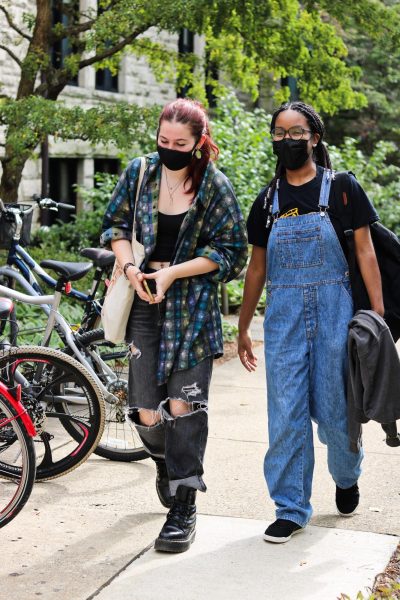College’s COVID Policies Fail Athletes
On a brisk Friday afternoon two weeks ago, I was on a bus heading down to Berea, KY with my teammates. We were going there to play our first game of the 2022 season for Oberlin baseball. It was our first official game in over two years, and the excitement across the team was palpable until one of my teammates got an email from Mercy Allen Hospital. Three days after receiving a test, he was informed that he had tested positive for COVID-19. He was asymptomatic, but regardless, the damage was done. He was around the team during practice — unmasked for that entire time without ever realizing that he had COVID.
While the coaching staff worked out a way to isolate him, he was asked to stand in the front of the bus, as far away from the team as possible. There are no ObieSafe policies on how to deal with such a situation, so the accompanying staff had to improvise a solution while the whole team shared a bus with our COVID-positive teammate. After a couple of hours, we stopped just outside Columbus, OH, where one of our assistant coaches volunteered to rent a car and take our teammate home. We went on to play our game in Kentucky like nothing happened.
Once we came back from Kentucky, the whole team was required to take a rapid test and a PCR test. Normally, athletes are only required to take a weekly PCR test, but these were extenuating circumstances. We were leaving the next day for a spring training trip to Florida, and our trainers wanted to see if there were any other positive cases on the team.
When I took the PCR test, I had a bit of a scratchy throat, but I assumed it was just allergies since I didn’t feel any additional symptoms. A small group of teammates and I took the test together, and everyone else’s test in my group was negative. Then came my turn. The scratchiness in my throat was joined by dread when I saw the second red line appear on my test. I had tested positive. I was devastated as my trainer told me to grab my baseball bag and head straight to my house to quarantine. Sadly, I wasn’t the only one. Four of my teammates and I ended up missing out on the biggest trip of our baseball season.
If the College had done everything in its power to implement effective COVID-19 testing policies, all the pain and frustration we’re experiencing now could have been easily avoided. This experience made it clear that Oberlin’s athlete-specific testing policies are performative and do nothing to prevent the spread of COVID-19. If my teammate had received his results on the same day he was tested, he would have never come to practice and the spread to our teammates would have been prevented. Instead, he was around our team without a mask for two hours a day for three whole days.
If the College really cares about our health and safety, it should implement rapid PCR testing for all athletes as a standard practice. This way, outbreaks like the one that occurred on my team would be far more preventable. Rapid PCR tests are just as effective as regular PCR tests, but results can be processed within hours. If these tests are made available instead of the regular PCR tests, athletes who test positive would be able to get their results and quarantine before ever setting foot on a practice field. The only reason for the College not to implement rapid PCR testing is that doing so would be more expensive than regular testing.
At the bare minimum, the school should provide rapid antigen tests on a weekly basis. These would not be as accurate as rapid PCR tests but would be a much more cost-effective option that achieves the same goal of preventing outbreaks. However, spending even a little bit more money to keep students safe seems to be too much for an institution who claims its goal is “to reduce health risks.” Unsurprisingly, our College’s administration is once again choosing frugality over the health and well-being of Oberlin students.
As we have seen throughout the pandemic, our administration’s negligence continues to negatively affect Oberlin students. If our administration really cares about our health and safety like they claim to, then their COVID-19 protocols must be changed going forward.




